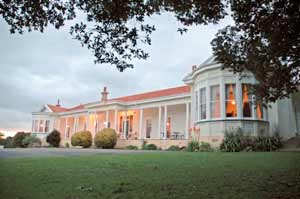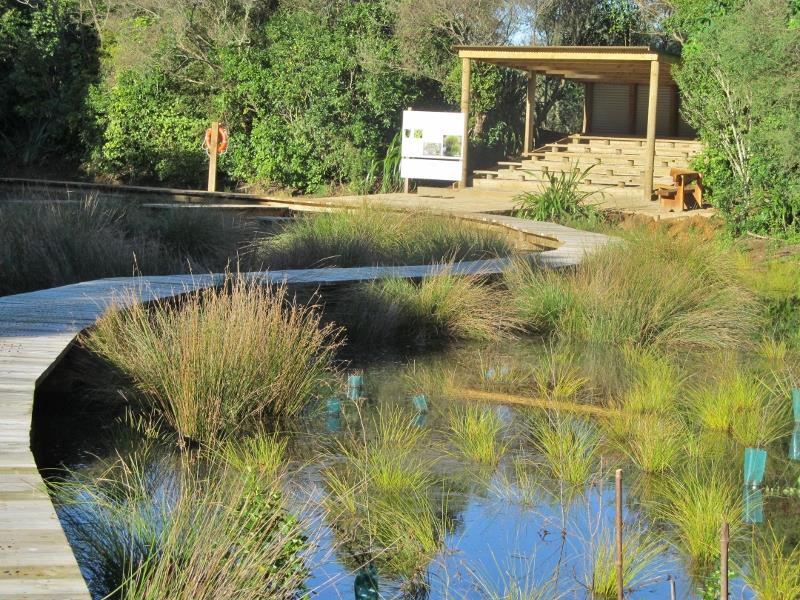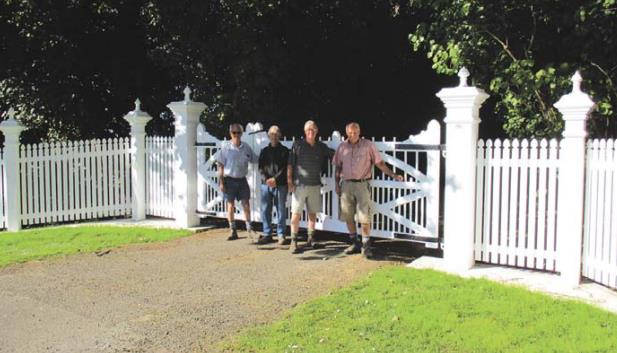
The new look Bushy Park Tarapuruhi has launched with the opening of a new visitor information centre on 14 September. Around 200 people attended Saturday's event, including Minister of Conservation Eugenie Sage and trust patron and Whanganui Mayor Hamish McDouall. The new visitor centre features interactive displays, including real birds' nests and bones and includes information on what the forest area means to iwi.
Bushy Park Trust chair Kevin Ross said the event marked the conclusion of years of hard work:
"We have a historic homestead restored to its former glory. The stables have been renovated to house a visitor interpretation centre, exhibition spaces for some of our heritage items and an upgraded ablutions block."
Bushy Park sanctuary is located on the west coast of the North Island, 25 kilometres north of Whanganui City. The sanctuary is a 100 hectare predator-free, native bird sanctuary, set amongst one of the few patches of virgin lowland forest. Ecological Management and Restoration, the journal of The Ecological Society of Australia and also SER International, the world’s premier restoration body, have ranked Bushy Park as one of Australasia’s top 25 restoration projects.
Within the Bushy Park Sanctuary there are 3.4 km of metalled or well-formed walking tracks throughout the forest providing easy all-weather access for visitors. Tree species include mahoe, mamaku, pukatea, rata, and rimu along with colonies of ferns and mosses. A feature of the reserve is a large northern rata Metrosideros Robusta named Ratanui (Big Rata). It is estimated to be between 500 and 1000 years old and is 43 metres in height and has a girth that exceeds 11 metres.
Within the Bushy Park Sanctuary there are 3.4 km of metalled or well-formed walking tracks throughout the forest providing easy all-weather access for visitors. Tree species include mahoe, mamaku, pukatea, rata, and rimu along with colonies of ferns and mosses. A feature of the reserve is a large northern rata Metrosideros Robusta named Ratanui (Big Rata). It is estimated to be between 500 and 1000 years old and is 43 metres in height and has a girth that exceeds 11 metres.

With a wide variety of birdlife thriving in the sanctuary, visitors are able to see or hear species such as bellbirds, kereru, north island robin, saddlebacks, hihi, moreporks as well as the falcon, fantail, grey warbler, mallard, pukeko, silvereye, kingfishers and white-faced heron. The sanctuary is home to some kiwi too. Giraffe weevils, glow-worms, and huhu beetles also inhabit Bushy Park.
The event was also a chance for the community to be thanked for its input. "It was a great opportunity to honour everyone who has given so much as volunteers, supporters and sponsors, especially the Rotary Club of Wanganui North which has done a lot of the physical work in fundraising." trustee Nicola Patrick said. "There have been many people involved over the years and it was lovely to have a number of former trustees and chairs present so we could thank them. Everything that culminated in the celebration is built on the back of all their efforts."
The sanctuary has an army of volunteers and it has been a special focus for the Rotary Club of Whanganui North. With this in mind the Bushy Park Trust and the Rotary Club of Wanganui North formed a partnership in late 2013 to develop and extend the park’s wetlands. With valuable assistance from Bushy Park trustee, Wilf Emmett and his machinery, this $35,000 plus project incorporates a boardwalk, amphitheatre, native planting and signage.
New forest tracks lead down to the wetlands from the homestead. Thanks to the overwhelming generosity of Whanganui businesses and individuals sponsoring $55 named planks, the 90 metre Rotary North boardwalk and its jetties have been fully funded and built by Rotarians. The boardwalk weaves across the wetland giving visitors an uninterrupted view of this beautiful tranquil area, with the surrounding native bush landscape reflecting in the water. The boardwalk is linked to the amphitheatre.
The Rotary North amphitheatre has been funded by Wanganui North Rotary, raising funds through a raffle and a matching grant from Rotary District 9940. The 60 seater amphitheatre is roofed to provide shelter and with its stunning views across the wetland, it will be used as an outdoor classroom for the many school groups visiting Bushy Park. A shed has been erected for storing the equipment used when observing the many water creatures in the pond.
The event was also a chance for the community to be thanked for its input. "It was a great opportunity to honour everyone who has given so much as volunteers, supporters and sponsors, especially the Rotary Club of Wanganui North which has done a lot of the physical work in fundraising." trustee Nicola Patrick said. "There have been many people involved over the years and it was lovely to have a number of former trustees and chairs present so we could thank them. Everything that culminated in the celebration is built on the back of all their efforts."
The sanctuary has an army of volunteers and it has been a special focus for the Rotary Club of Whanganui North. With this in mind the Bushy Park Trust and the Rotary Club of Wanganui North formed a partnership in late 2013 to develop and extend the park’s wetlands. With valuable assistance from Bushy Park trustee, Wilf Emmett and his machinery, this $35,000 plus project incorporates a boardwalk, amphitheatre, native planting and signage.
New forest tracks lead down to the wetlands from the homestead. Thanks to the overwhelming generosity of Whanganui businesses and individuals sponsoring $55 named planks, the 90 metre Rotary North boardwalk and its jetties have been fully funded and built by Rotarians. The boardwalk weaves across the wetland giving visitors an uninterrupted view of this beautiful tranquil area, with the surrounding native bush landscape reflecting in the water. The boardwalk is linked to the amphitheatre.
The Rotary North amphitheatre has been funded by Wanganui North Rotary, raising funds through a raffle and a matching grant from Rotary District 9940. The 60 seater amphitheatre is roofed to provide shelter and with its stunning views across the wetland, it will be used as an outdoor classroom for the many school groups visiting Bushy Park. A shed has been erected for storing the equipment used when observing the many water creatures in the pond.

Cranleigh Chainey led the Rotary committee dedicated to the project and helped inspire the Rotarian and non-Rotarian volunteers. They would come out at least once, sometimes twice a week. Fellow Rotarian and past Bushy Park board member for six years, Dennis McGowan says of Cranleigh, “Without his passion, determination and perseverance, the project would never have succeeded. Bushy Park owes Cranleigh a big debt of gratitude.”
At the same time a Rotary led six person funding committee was formed for Bushy Park and raised, Cranleigh says, “A staggering $1.1 million from trusts, lotteries and a benefactor as well as other sources, to renew the toilet block, build an implement shed and volunteer room, build a soon to be opened state of-the art visitor centre, heritage display and a complete renovation of the exterior of the historic stables and homestead.” Cranleigh adds this project “is one of the largest recent hands-on projects within Rotary District 9940, which covers the lower half of the North Island. Our club is proud to be involved in the Bushy Park upgrade to benefit education, promote the forest and its birdlife and preserve the heritage buildings. But best of all were the working bees, comradery and the fun that we had.”
At the same time a Rotary led six person funding committee was formed for Bushy Park and raised, Cranleigh says, “A staggering $1.1 million from trusts, lotteries and a benefactor as well as other sources, to renew the toilet block, build an implement shed and volunteer room, build a soon to be opened state of-the art visitor centre, heritage display and a complete renovation of the exterior of the historic stables and homestead.” Cranleigh adds this project “is one of the largest recent hands-on projects within Rotary District 9940, which covers the lower half of the North Island. Our club is proud to be involved in the Bushy Park upgrade to benefit education, promote the forest and its birdlife and preserve the heritage buildings. But best of all were the working bees, comradery and the fun that we had.”

Outside the new front entrance – Rotary members Wilf Emmett, Graeme Foster, Cranleigh and Bryce Connybeer.
Guests at the opening were offered guided walks through the protected forest and wetland and a tour of the Heritage New Zealand Category 1 listed homestead. Last month Bushy Park adopted "Tarapuruhi" into its name, which means "a place of abundant bird life."
Conservation Minister Eugenie Sage, who was also launching Conservation Week, said “Whanganui residents were fortunate to have such a treasure so close to town. Tarapuruhi Bushy Park is unique nationally because of its combination of a 100 hectare remnant of rich coastal lowland forest protected as a sanctuary for plants and wildlife with its predator proof fence and its celebration of Whanganui's colonial and farming heritage. It's a place where people can experience impressive forests; learn more of our colonial and farming history and the stories of Ngaa Rauru Kiitahi."
To all Rotarians and friends: If you are in the Whanganui area, please take time to visit Bushy Park, 791 Rangitatau East Rd, Kai Iwi. Its homestead, native forest, bird life and now it’s developed wetland are a special must see in the Whanganui region.
Conservation Minister Eugenie Sage, who was also launching Conservation Week, said “Whanganui residents were fortunate to have such a treasure so close to town. Tarapuruhi Bushy Park is unique nationally because of its combination of a 100 hectare remnant of rich coastal lowland forest protected as a sanctuary for plants and wildlife with its predator proof fence and its celebration of Whanganui's colonial and farming heritage. It's a place where people can experience impressive forests; learn more of our colonial and farming history and the stories of Ngaa Rauru Kiitahi."
To all Rotarians and friends: If you are in the Whanganui area, please take time to visit Bushy Park, 791 Rangitatau East Rd, Kai Iwi. Its homestead, native forest, bird life and now it’s developed wetland are a special must see in the Whanganui region.